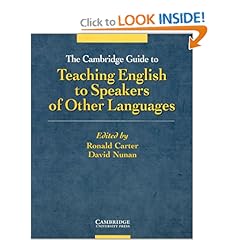The Cambridge Guide to Teaching English to Speakers of Other Languages
By Ronald Carter and David Nunan
Review
‘The Cambridge Guide is to be welcomed and used wisely by all in the field. My graduate courses in TESOL will be considerably enhanced by this book. This is a must for your bookshelf.’ ESL Magazine, Brazil
‘Most chapters are reader-friendly, neither patronisingly simple nor pretentiously complicated, offering ideas to both the uninitiated and the experienced. By trying to forge links between theory and practice, research and classroom teaching, this volume does good service to the profession.’ ELT Journal
Book Description

This book is the first to present in one volume an up-to-date guide to the central areas of teaching English to speakers of other languages (TESOL). Edited by two leading figures in TESOL, it contains 30 chapters written by internationally recognised language teaching professionals and applied linguists. Current topics in TESOL are examined and future developments mapped out in an accessible but comprehensive way. The book includes: – 30 chapters looking at core areas of TESOL – a list of essential reading – a detailed glossary of terms This books helps define TESOL and provides an excellent introduction for future language teaching professionals and is essential reading for students on undergraduate and postgraduate courses.
More Details
- Paperback: 304 pages
- Publisher: Cambridge University Press (March 5, 2001)
- Language: English
- ISBN-10: 0521805163
- ISBN-13: 978-0521805162
- Price: $24.76
A Garcia (Monterey, CA)I found this book to be a great addition to my TESOL collection. Short, accurate chapters on all or most issues relevant to the TESOL world today are written by some of the field’s most distinguished scholars.I read that some reviewers found the terms and writing style to be pretentious jargon, however, I don’t think these reviewers give the TESOL field its due. Academic language is part of being a scholar.
J Wilson (USA)I wrote the first review of this book above, but after more consideration, I’m downgrading it to 2 stars.This book is obviously an attempt to legitimize the TESOL field by the use of lofty language and faux-scholarly writing. TESOL instructors want to be taken seriously, as practitioners of a profession like law, medicine, etc., so they’re trying to puff themselves up in the eyes of potential TESOL teachers (like myself).
Often it becomes quite comic. Here’s a quote:
“Krashen (1982) claimed that ‘comprehensible input’ was a necessary condition for language learning…further development from the learner’s current stage of language knowledge can only be achieved by the learner ‘comprehending’ language that contains linguistic items…”
In other words, in order to learn a new language, you have to understand it, and in order to learn more, you have to understand more…
Words of wisdom from on high! Holy crap…talk about disguising the obvious in a cloak of jargon and didactic fog! The book is full of gems like the one I just quoted. Yes, there are some useful little pieces of information peppered throughout the book, but it’s so clear that the authors were in effect saying “please, please, take us seriously! We’re professionals! We want to be respected! We want you to look up to us! Teaching language is sooooooo amazingly complicated! Oh, you pathetic little potential teachers would be lost without our wisdom.”

1 comment